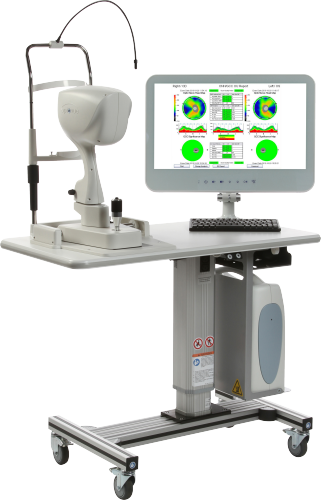Retinal Diseases and Disorders
Advanced Eye Care has a Board Certified retinal specialist on staff who is fellowship trained in the treatment of all medical and surgical retinal disease and laser surgery.
There are many different types of retinal disease ranging from diabetic eye disease to retinal detachment. The retina is the light-sensitive layer of tissue that lines the inside of the eye and sends visual messages through the optic nerve to the brain. Retinal diseases affect the retina specifically, but can also affect the macula (responsible for central vision) or the fovea (the center of the macula). It is important to be aware of any vision changes, as the symptoms of retinal diseases are usually painless.
Retinal diseases are varied; some are more common, while others are rare and need more complex treatment. The different types of retinal diseases also carry with them an array of symptoms.
Some of the retinal diseases that the doctors at Advanced Eye Care treat are:
Diabetic Retinopathy
If you have diabetes, you are at risk to develop Diabetic Retinopathy. Regular comprehensive eye dilated examinations with your ophthalmologist are very important. By maintaining strict control of your blood sugar levels, you will significantly lower your risk of vision loss. Diabetic Retinopathy is the result of damage caused by diabetes to the small blood vessels located in the retina. Symptoms may include: blurred vision, eye strain, floaters and double vision.
Diabetic Retinopathy has four stages:
1. Mild Nonproliferative Retinopathy. At this earliest stage, microaneurysms occur. They are small areas of balloon-like swelling in the retina’s tiny blood vessels.
2. Moderate Nonproliferative Retinopathy. As the disease progresses, some blood vessels that nourish the retina are blocked.
3. Severe Nonproliferative Retinopathy. Many more blood vessels are blocked, depriving several areas of the retina with their blood supply. These areas of the retina send signals to the body to grow new blood vessels for nourishment.
4. Proliferative Retinopathy. At this advanced stage, very small blood vessels grow from the surface of the retina. These new blood vessels are abnormal and fragile. that fills the inside of the eye. By themselves, these blood vessels do not cause symptoms or vision loss. However, they have thin, fragile walls, and if they leak blood, severe vision loss and even blindness can result.
During the first three stages of diabetic retinopathy, no treatment is needed, unless you have macular edema. The advanced stages of Proliferative Retinopathy require the treatment of laser surgery. To prevent progression of diabetic retinopathy, people with diabetes should control their levels of blood sugar, blood pressure, and blood cholesterol.
Age-Related Macular Degeneration
Age-Related Macular Degeneration (AMD) is a common eye disease associated with aging that gradually destroys sharp, central vision. AMD affects the macula, the part of the eye that allows you to see fine detail.
Dry AMD
Dry AMD is the more common form of AMD. It occurs in about 90 percent of people who have the condition. One of the most common early signs of dry AMD is drusen, which are yellow deposits under the retina. They often are found in people over age 60.Other symptoms include blurred central vision, blind spots and difficulty seeing color and fine detail
Dry AMD has three stages, and these symptoms may occur in one or both eyes. Once dry AMD reaches the advanced stage, no form of treatment will prevent loss of vision. However, treatment can delay and possibly prevent intermediate AMD from progressing to the advanced stage, in which vision loss occurs.
Wet AMD
Wet AMD (also considered advanced AMD) occurs when abnormal blood vessels behind the retina start to grow under the macula. These new blood vessels tend to be very fragile and often leak blood and fluid. With wet AMD, loss of central vision can occur quickly. It does not have stages like dry AMD. In early stages of wet AMD, straight lines may appear wavy. You may also develop a blind spot that causes the loss of central vision.
The earliest signs of AMD in the retina can be detected by a retina specialist before you have any vision loss. Those who have had the disease for some time may notice changes in vision that involve symptoms of dry and wet AMD. If you have lost some sight from AMD, the retinal specialists at Advanced Eye Care can help you with low vision services and devices that may help you make the most of your remaining vision.
Retinal Detachment
The retina is the light-sensitive layer of tissue that lines the inside of the eye and sends visual messages through the optic nerve to the brain. When the retina detaches, it is lifted or pulled from its normal position. If not treated promptly, retinal detachment can cause permanent vision loss. In some cases there may be small areas of the retina that are torn. These areas, called retinal tears or retinal breaks, can lead to retinal detachment. A retinal detachment can occur at any age, but it is more common in people over age 40.
Symptoms include a sudden or gradual increase in either the number of floaters, which are little “cobwebs” or specks that float about in your field of vision, and/or light flashes in the eye. Another symptom is the appearance of a curtain over the field of vision. A retinal detachment is a medical emergency. Anyone experiencing the symptoms of a retinal detachment should see an eye care professional. A qualified retinal specialist is the person who can best treat these problems with laser or surgery immediately

